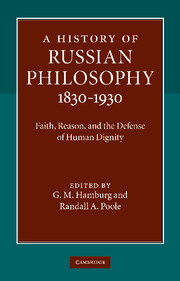Book contents
- Frontmatter
- Contents
- List of contributors
- Acknowledgments
- Introduction: The humanist tradition in Russian philosophy
- I The Nineteenth Century
- II Russian Metaphysical Idealism in Defense of Human Dignity
- III Humanity and Divinity in Russian Religious Philosophy after Solov′ëv
- 8 A Russian cosmodicy: Sergei Bulgakov's religious philosophy
- 9 Pavel Florenskii's trinitarian humanism
- 10 Semën Frank's expressivist humanism
- IV Freedom and Human Perfectibility in the Silver Age
- V Russian Philosophy in Revolution and Exile
- Afterword: On persons as open-ended ends-in-themselves (the view from two novelists and two critics)
- Bibliography
- Index
8 - A Russian cosmodicy: Sergei Bulgakov's religious philosophy
Published online by Cambridge University Press: 05 June 2012
- Frontmatter
- Contents
- List of contributors
- Acknowledgments
- Introduction: The humanist tradition in Russian philosophy
- I The Nineteenth Century
- II Russian Metaphysical Idealism in Defense of Human Dignity
- III Humanity and Divinity in Russian Religious Philosophy after Solov′ëv
- 8 A Russian cosmodicy: Sergei Bulgakov's religious philosophy
- 9 Pavel Florenskii's trinitarian humanism
- 10 Semën Frank's expressivist humanism
- IV Freedom and Human Perfectibility in the Silver Age
- V Russian Philosophy in Revolution and Exile
- Afterword: On persons as open-ended ends-in-themselves (the view from two novelists and two critics)
- Bibliography
- Index
Summary
Sergei Nikolaevich Bulgakov was born in 1871 in Orel Province in the Russian black-earth region. His father was an Orthodox priest; his mother also came from a priestly line. In later years Bulgakov liked to present himself as a “levite”; Evgenii Trubetskoi told him he was “born in a stole.” Not surprisingly, Bulgakov commenced his secondary education in Orel Theological Seminary. But in 1888 he transferred to a state gymnasium and two years later entered the law faculty of Moscow University, where he studied political economy. The levite had lost his Christian faith and joined the first generation of Russian Marxists.
THE MARXIST ECONOMIST
In his first book, On Markets in the Capitalist Form of Production (1897), Bulgakov introduced himself as a person who “shares the sociological point of view,” by which he meant someone “who recognizes the regularity of the development of the forms of society, [a regularity] which cannot be eliminated by any concerted efforts on the part of ‘critically minded individuals.’” “Critically minded individuals” was a term from Russian populism, the dominant stream in Russian radicalism from the 1870s to the mid-1890s. The populists believed the achievement of social justice in Russia would be facilitated by enlightened individuals acting with and on behalf of the peasant masses to transform the political order. By the 1890s, this recipe for changing Russia had become stale. Young social activists were looking for a more organic grounding of social and political justice.
Keywords
- Type
- Chapter
- Information
- A History of Russian Philosophy 1830–1930Faith, Reason, and the Defense of Human Dignity, pp. 171 - 189Publisher: Cambridge University PressPrint publication year: 2010
- 1
- Cited by



